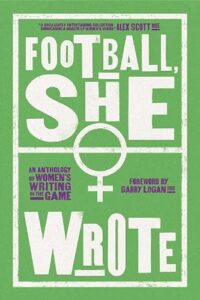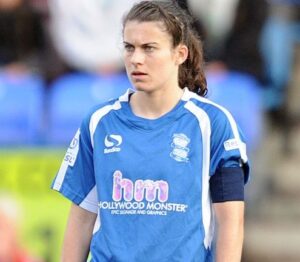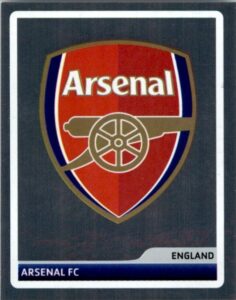Q&A with Jade Craddock. Part 2 – Football background
 FBR has some talented contributors, none more so that Jade Craddock who has been a regular writer for FBR with her insightful book reviews and articles covering the delayed 2020 Euros and the start of the 2021/22 Premier League and Women’s Super League. Jade’s talents have been recognised with a chapter in Football She Wrote. As part of the launch of the book, FBR caught up with Jade to find out a bit more about her football and writing background. This second part of the interview looks at Jade’s connection with the game as fan and a player.
FBR has some talented contributors, none more so that Jade Craddock who has been a regular writer for FBR with her insightful book reviews and articles covering the delayed 2020 Euros and the start of the 2021/22 Premier League and Women’s Super League. Jade’s talents have been recognised with a chapter in Football She Wrote. As part of the launch of the book, FBR caught up with Jade to find out a bit more about her football and writing background. This second part of the interview looks at Jade’s connection with the game as fan and a player.
FBR: What was your first football memory?
JC: My first football memory is probably around the age of seven or eight. I wasn’t really aware of football as a professional sport, or particularly of teams or leagues at this point, and certainly, this would have been just before or around the launch of the Premier League and there just wasn’t the omnipresence of football at that stage. But at primary school, lunchtimes and break times would mean a football – or several – appearing and the boys taking over one half of the playground. Or rather the boys, and me. At this point, I had never had any coaching or been taught to play, but I just naturally gravitated towards football and seemed to know what to do. And the great thing was, despite being the only girl who joined in, there was never any feeling of being marginalised or excluded by the boys but being treated equally and fairly – probably because I held my own. Thankfully, my experience throughout football, whether I was playing at school or casually, continued in this vein.
FBR: Did you continue to play football after leaving school?
JC: As mentioned, I started playing football at primary school, just joining in with the boys in the playground. There was no provision for girls’ football then and no other girls who seemed to be interested, but it never really crossed my mind that girls’/women’s football existed then. When I moved to middle school (it’s a three-tier system where I am), and I was around 10, I discovered some other girls who played football and they told me about their team. This pretty much blew my mind at the time – women’s football was really not visible back then and the idea that there were actual teams that I could play for was incredible. So I joined this local football team, but it had plenty of challenges, because girls’ football was very much still finding its feet (excuse the pun) and getting players involved and then getting to and from games was all tricky, and inevitably after a couple of years that team folded, but I’d already been introduced to the women’s set-up and was regularly training with them when I was 14.

However, I still wasn’t ready physically for that step-up, so I moved to another nearby girls’ U16 side who’d just been promoted to the top league, which had all of your centre of excellences and academy sides – the likes of Leicester City, Derby County. And that was an eye-opener, especially when we played Birmingham City and I came up against a young Karen Carney. We lined up directly opposite each other as wingers and although I got named player of the match for my team, Karen really was head and shoulders above every other player on the pitch – and indeed every other player I’d come up against before and after! She could use both feet and was skilful and just an amazing talent and it’s been great to follow her career and to see her excel on the world stage.
After that one season with the U16s, I made the step-up to the local women’s team and, honestly, the seasons there were my absolute highlight. We had some really excellent players – I’m not sure how we found them – or they found us – but it seemed as if they had all ended up in this little town in the Midlands at the same time. They were women of all ages who’d played all over, and their experience and quality was really something. There were players there that could have easily gone on to a much higher level had the opportunities been available.
When people talk about how far the women’s game has come on in recent years, I think we have to be careful of disparaging earlier generations. My mum played in the seventies and when she watched my team in the 2000s, the main difference was not that the players were significantly better, but the opportunities had increased, which meant there were more players involved and naturally a higher overall standard. But, individually, there were players in my generation, in my mum’s generation and the generations before that were exceptional; the women’s game simply wasn’t ready. Now, we’re getting there, because the organisation and infrastructure has improved exponentially and there’s a much wider pool of players and better coaching and facilities but put those earlier players in this era and they’d have shone. Indeed, we were incredibly lucky in my team to have had such a strong collection of players and I would have loved some of those players to have had an opportunity to play in this era.
FBR: Do you think playing the game has helped your writing?
Absolutely. I think it gave me an added understanding and appreciation of some of the nuances of the game. Having been in particular situations and matches, I’m more aware of certain things than I think I would have been otherwise. I’m sure I would still have been interested and engaged in football had I not played, but I don’t think I’d have had such an understanding. Although, in truth, I never really had much coaching as such. In those days, training was literally turn up, jog around a bit, a few passing drills of no particular difficulty, then small-sided games! But I like to think I had a fairly natural football intelligence – in fact, I could probably read the game and see it more than I could pull it off!
FBR: So we know a bit about your playing career, but what about who you support?
 JC: I grew up and live in the Midlands – my nearest league clubs being Birmingham City and Aston Villa, so obviously I’m an Arsenal fan! I did almost take a couple of different paths though. Villa was very much the club of choice in my school in the nineties – and that green and black Muller kit almost sold them to me, as well as the likes of Tony Daley and Dalian Atkinson, who were probably the first footballers I was really aware of. I also did work experience at Villa when I was 15 and there couldn’t be a nicer footballer than Cesc Fabregas. Alas, even Dion couldn’t sway me to the claret and blue in the end. In the late nineties when I moved to middle school, Liverpool were suddenly all the rage – it probably had something to do with those white suits?! And for a time, Liverpool were somewhat on my radar, not least because of Michael Owen’s heroics at World Cup 1998. But again, it wasn’t to be. When I started playing football myself in earnest and suddenly became much more aware of the game, began watching it religiously and understanding it as more than just a casual observer, there was really only one team at the time that played football the way I dreamt and imagined it should be played at its best – Arsenal. This was the age of Pires and Ljungberg and as a young winger myself, here were two proper attacking wingers. Add to that, the general ethos and style of play under Wenger in that period and the players in that squad and I was hooked. But one man ensured my heart was red – Cesc Fabregas. To me, he was everything that epitomised that Arsenal – stylish, intelligent, committed. He was, and remains, my favourite player. I’d always hoped he’d come back to the Emirates and thought we could have done more to bring him back when he left Barcelona, but even though he ended up at Chelsea, I always felt his heart was at Arsenal and if you took off that blue jersey there’d be a red one underneath – well, that’s what I told myself anyway!
JC: I grew up and live in the Midlands – my nearest league clubs being Birmingham City and Aston Villa, so obviously I’m an Arsenal fan! I did almost take a couple of different paths though. Villa was very much the club of choice in my school in the nineties – and that green and black Muller kit almost sold them to me, as well as the likes of Tony Daley and Dalian Atkinson, who were probably the first footballers I was really aware of. I also did work experience at Villa when I was 15 and there couldn’t be a nicer footballer than Cesc Fabregas. Alas, even Dion couldn’t sway me to the claret and blue in the end. In the late nineties when I moved to middle school, Liverpool were suddenly all the rage – it probably had something to do with those white suits?! And for a time, Liverpool were somewhat on my radar, not least because of Michael Owen’s heroics at World Cup 1998. But again, it wasn’t to be. When I started playing football myself in earnest and suddenly became much more aware of the game, began watching it religiously and understanding it as more than just a casual observer, there was really only one team at the time that played football the way I dreamt and imagined it should be played at its best – Arsenal. This was the age of Pires and Ljungberg and as a young winger myself, here were two proper attacking wingers. Add to that, the general ethos and style of play under Wenger in that period and the players in that squad and I was hooked. But one man ensured my heart was red – Cesc Fabregas. To me, he was everything that epitomised that Arsenal – stylish, intelligent, committed. He was, and remains, my favourite player. I’d always hoped he’d come back to the Emirates and thought we could have done more to bring him back when he left Barcelona, but even though he ended up at Chelsea, I always felt his heart was at Arsenal and if you took off that blue jersey there’d be a red one underneath – well, that’s what I told myself anyway!
FBR: Than you Jade and good luck with the book.
Pingback: Q&A with Jade Craddock. Part 1 – Writing and ‘Football She Wrote’ anthology – football book reviews